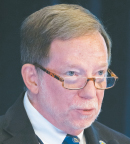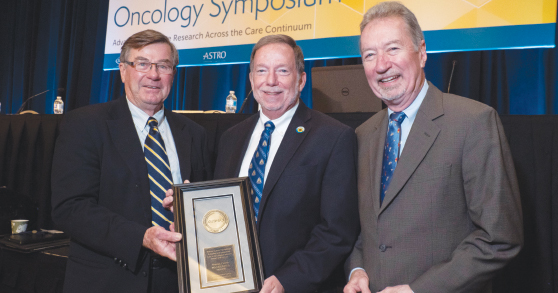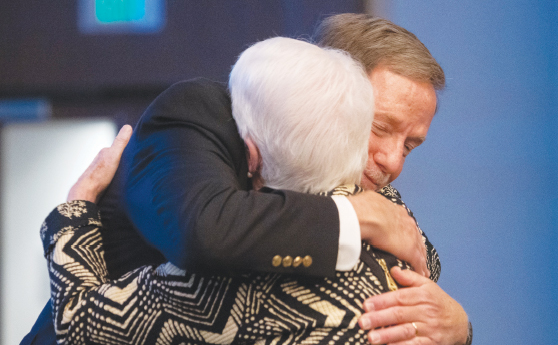
Thomas J. Smith, MD, FACP, FASCO, FAAHPM
Among the highlights at the 2019 Supportive Care in Oncology Symposium in October was the keynote address by Thomas J. Smith, MD, FACP, FASCO, FAAHPM, the Harry J. Duffey Family Professor of Palliative Medicine and Director of Palliative Medicine at Johns Hopkins Medicine and Professor of Oncology at Johns Hopkins University School of Medicine, a retrospective of his 35-year career in the field of oncology. A pioneer in palliative medicine, Dr. Smith was honored at the meeting with the Walther Cancer Foundation Palliative and Supportive Care in Oncology Endowed Award and Lecture for his significant contributions to palliative and supportive care to improve the quality of life for patients from a cancer diagnosis through the end of life.
During his presentation, Dr. Smith recounted a history of his life’s work in palliative care, including his early work with ASCO to develop educational programs to improve end-of-life care for patients with cancer,1 and the subsequent publications of ASCO’s 20122 and 20173 palliative care guideline recommendations on the integration of palliative care into standard oncology care for all patients diagnosed with cancer. He also talked about the success of the Virginia Rural Cancer Outreach Program, which he and his colleagues started in the late 1980s, and the impact it has had on improving survival and quality-of-life outcomes in underserved communities in the state, while reducing costs of care through coordinated care programs that helped to reduce hospital admissions.

Thomas J. Smith, MD, FACP, FASCO, FAAHPM (center) was honored for his leadership in the field of oncology palliative care with the Walther Cancer Foundation Palliative and Supportive Care in Oncology Endowed Award and Lecture during the 2019 Supportive Care in Oncology Symposium. With Dr. Smith are D. Craig Brater, MD, Vice President of Programs at the Walther Cancer Foundation (left), and Gregory L. Pemberton, Chairman of the Walther Cancer Foundation (right).
Interspersed within Dr. Smith’s remarks were the health difficulties he has faced. They include heart disease, a diagnosis of prostate cancer in 2016, its recurrence 15 months later, and the depression that first appeared while he was a second-year resident at the University of Pennsylvania and then returned with such severity after his prostate cancer recurrence that he considered suicide.
In a candid interview with The ASCO Post, Dr. Smith discussed his struggles with cancer and the debilitating side effects of its treatment, overcoming depression, and facing mortality.
Coping With Serious Illnesses
You have confronted several serious illnesses over your life, including an aortic aneurysm, prostate cancer, and bouts of depression. When did your heart problem appear?
I was born with bicuspid aortic valve disease and aortic aneurysm, although I didn’t know it until about 10 years ago, after completing a 100-mile race in 23 hours. I was coughing at the end of the run, and my wife, Joann, insisted I get a chest x-ray, which purported to show a nodule on my upper right lung. A subsequent CT scan didn’t find any nodules in my lungs, but it did show calcifications in my aortic valve and what looked to be an enlarged heart, which was easily explained by the thousands of miles I’ve run in races over my lifetime.
I underwent further tests, which found that my aorta was indeed enlarged and that, although my aortic valve started out with the normal three leaflets, two of them were partly fused. The question became, do I get my aorta and aortic valve replaced, which would end my running career, or do I wait to see if the condition progresses? After consulting with an aortic cardiologist who had been following several patients with bicuspid aortic valve disease and the same aortic enlargement that I have and who had not progressed to acute aortic rupture or dissection, I decided not to have the surgery.
After my cancer diagnosis, I lost everything, including my remaining sense of innocence, and I had a glimpse into a more imminent mortality.— Thomas J. Smith, MD, FACP, FASCO, FAAHPM
Tweet this quote
However, this is the type of uncertainty we ask our patients to deal with all the time. I realized that for me, like some of my patients, life had suddenly become a whole lot less certain and that I probably would die sooner than a healthy person my age.
What would have helped me the most as a patient with this heart condition, and the subsequent prostate cancer, lung failure, and depression, is if one of my physicians had asked me the simple question, “How are you coping?” Especially after the prostate cancer diagnosis and treatment, I would have answered, “This is awful. Not only am I facing death from cancer now that it has recurred following surgery, I’m dealing with the side effects from androgen-deprivation therapy and radiation therapy, including horrific fatigue; profound muscle weakness; lung failure; and, to add insult to injury, distressing loss of sexuality, difficult or even painful orgasms, and leakage of both urine and occasionally stool.”
In those moments—it is never just one moment but a series of accumulations—after my cancer diagnosis, I lost everything, including my remaining sense of innocence, and I had a glimpse into a more imminent mortality. It was hard for an ultra-marathoner to understand.
Confronting Mortality
You first experienced serious depression when you were in the second year of your medical residency. Please talk about the circumstances of that depression and how long it lasted.
I had excelled as an undergraduate at the University of Akron and in medical school at Yale University School of Medicine, with no signs or symptoms of depression. And then in the second year of my residency at the University of Pennsylvania, I found myself unable to get out of bed. I kept at my workload as best I could, but I knew something was wrong and I needed help. I was diagnosed with depression and later learned from my parents that they had both suffered from depression as young people as well.
It is important for us to learn to screen patients for depression and also to screen for demoralization, which is the helplessness and hopelessness you get from being sick.— Thomas J. Smith, MD, FACP, FASCO, FAAHPM
Tweet this quote
A psychiatrist offered me the standard antidepressant at the time, amitriptyline, and he kept increasing the dose, which caused trouble with my vision and urination and, eventually, a grand mal seizure. My wife performed CPR, and I woke up in the ICU at Pennsylvania Hospital. Luckily, the seizure seemed to “reset” my brain, and I didn’t experience serious depression again until 2 years later. I was fortunate to meet with a very good psychiatrist who believed in the value of talk therapy in addition to medication. After tapering off the medication, I got back to my usual self and thought I would never have a problem with depression again.
For nearly 40 years, I was depression-free until my prostate cancer recurred. I experienced horrible side effects from its treatment, including complete insomnia, drenching hot flashes every 45 minutes, and muscle weakness. I think, in the past, running helped prop me up during a lot of difficult times, staving off depression, but now I couldn’t run and became more and more depressed.
Contemplating Suicide
During your presentation at the Supportive Care in Oncology Symposium, you described how learning that your prostate cancer had recurred and was now incurable exacerbated your depression to the point you considered suicide and had to be hospitalized. Can you describe your emotional state at this time?
I had been undergoing a long tailspin of despair. I continued to work during this time and had been seeing a counselor for burnout, because I was having a hard time seeing patients for end-of-life care. Although I wasn’t at the end of life myself, I could see it in the not-too-distant future, and that was emotionally hard for me. Coupled with coming to terms with my mortality, I had the added stress of feeling so sick from the androgen-deprivation therapy, which, in addition to other side effects, ultimately caused a transient ischemic attack. I developed restrictive lung disease after treatment, which left me with a pulmonary function test value of 50% for a person my age. Plus, the insomnia and hot flashes, yikes!

Dr. Smith embraces his wife, Joann, after giving his emotional lecture, Supportive Cancer Care: A 35-Year Retrospective, in which he recounted a history of his life’s work in palliative care and the personal health challenges he is facing.
So, now, I not only had cancer to contend with, I had another, much larger Sword of Damocles hanging over my head: another, potentially more serious, stroke. My psychiatrist had prescribed a number of medications to help with the side effects from the cancer treatment, including venlafaxine and then gabapentin for the hot flashes, but they didn’t help. I was then prescribed duloxetine, which had been shown in a couple of small randomized trials to reduce hot flashes in women, to help with my depression. However, it didn’t do much for either problem, and I got to the point where I couldn’t see anything ever getting better or finding joy in anything ever again.
Alone at our house in Virginia, I had fixated on a tree at a fishing pier that I might use to hang myself. When I didn’t check in with my wife at an appointed time we had agreed on, she called a neighbor to check on me, and he found me sitting in a heap crying. I never made the suicide attempt, but we all figured I should be in a hospital for evaluation and treatment.
My psychiatrist started me on another antidepressant and increased my office visits. That seems to have stabilized my mood, and I’m my usual self now.
Screening Patients for Signs of Depression
What has this experience taught you about the importance of asking patients with cancer about their emotional health and their fears as they go through treatment? How can oncologists initiate these difficult conversations with their patients?
As oncologists, it is important for us to learn to screen patients for depression and also to screen for demoralization, which is the helplessness and hopelessness you get from being sick. I think I had a lot of both. In my own practice, I use one or two questions to screen for depression. The first one is, “Do you feel depressed some or most of the time?” And the follow-up question is, “Is there anything that brings you joy?” These questions have really good sensitivity and specificity for diagnosing clinical depression in patients with cancer.
In my case, my therapist had me write out a list of difficult times I had had in the past and the strengths I brought to bear that helped me get through those tough times. We talked about how I could bring those strengths to my current situation. It is a good exercise and has helped me.
For oncologists, these types of discussions require us in a real sense to be present with our patients, asking probing questions and listening to their answers as well as building -rapport and confidence with our patients. We are in a unique position because we love our patients and they love us. We’re so close to them, it is almost like practicing family medicine, except our patients have a serious illness, which gives us an incredible opportunity to be close with them and know them in a way very few other medical professionals get to do.
Some things I’ve found useful when communicating with patients are sharing my own experiences, bringing my full self to the therapeutic encounter, and using my own experiences to make me a better listener and a better doctor. We should all be asking our patients about depression, because it can be treated.
Living With Uncertainty and Enjoying Life
How are you feeling today?
I’m doing well. I’ve run two half-marathons in the past 2 months. My lung function is still at 70% of the predicted value, which means I have to work extra hard to do anything that takes exertion, but I am still able to run, sort of, and think my mood is good.
I am changing some aspects of my job and see fewer patients who need end-of-life care. I’m concentrating instead on providing pain management and other facets of palliative care for patients, so psychologically, I’m doing better, and the future looks good.
PALLIATIVE CARE
For more on palliative care and outpatient treatment, see an interview with Thomas J. Smith, MD, FACP, FASCO, FAAHPM, on The ASCO Post Newsreels at ascopost.com/video.
In terms of my cancer, I’m in that neverland of uncertainty waiting to see what happens over the next year, which is what many of our patients are facing. Having cancer has given me a newfound appreciation and understanding of what our patients experience, and I’m a more empathetic physician as a result. I’ve even written a few articles about my experiences.4-6 (One of my coauthors, Terry Langbaum, an administrator at Johns Hopkins Hospital, died of cancer on November 14, 2019; she led a great life with no regrets.)
Despite having cancer, I’m having the most fun I’ve ever had in medicine, relieving patients’ pain and helping their demoralization. I’m fortunate to have this life, this wife, and this career. ■
DISCLOSURE: Dr. Smith or an immediate family member has been employed by UpToDate and receives royalties for his work on the Oxford Textbook of Palliative Care Communication.
REFERENCES
1. Smith TJ, Schnipper LJ: The American Society of Clinical Oncology program to improve end-of-life care. J Palliat Med 1:221-230, 1998.
2. Smith TJ, Temin S, Alesi ER, et al: American Society of Clinical Oncology provisional clinical opinion: The integration of palliative care into standard oncology care. J Clin Oncol 30:880-887, 2012.
3. Ferrell BR, Temel JS, Temin S, et al: Integration of palliative care into standard oncology care: American Society of Clinical Oncology clinical practice guideline update. J Clin Oncol 35:96-112, 2017.
4. Smith TJ, Loprinzi CL, Deville C: Oxybutynin for hot flashes due to androgen deprivation in men. N Engl J Med 378:1745-1746, 2018.
5. Langbaum T, Smith TJ: Time to study metastatic-cancer survivorship. N Engl J Med 380:1300-1302, 2019.
6. Smith TJ, Ashar BH: Iron deficiency anemia due to high-dose turmeric. Cureus 11:e3858, 2019.

